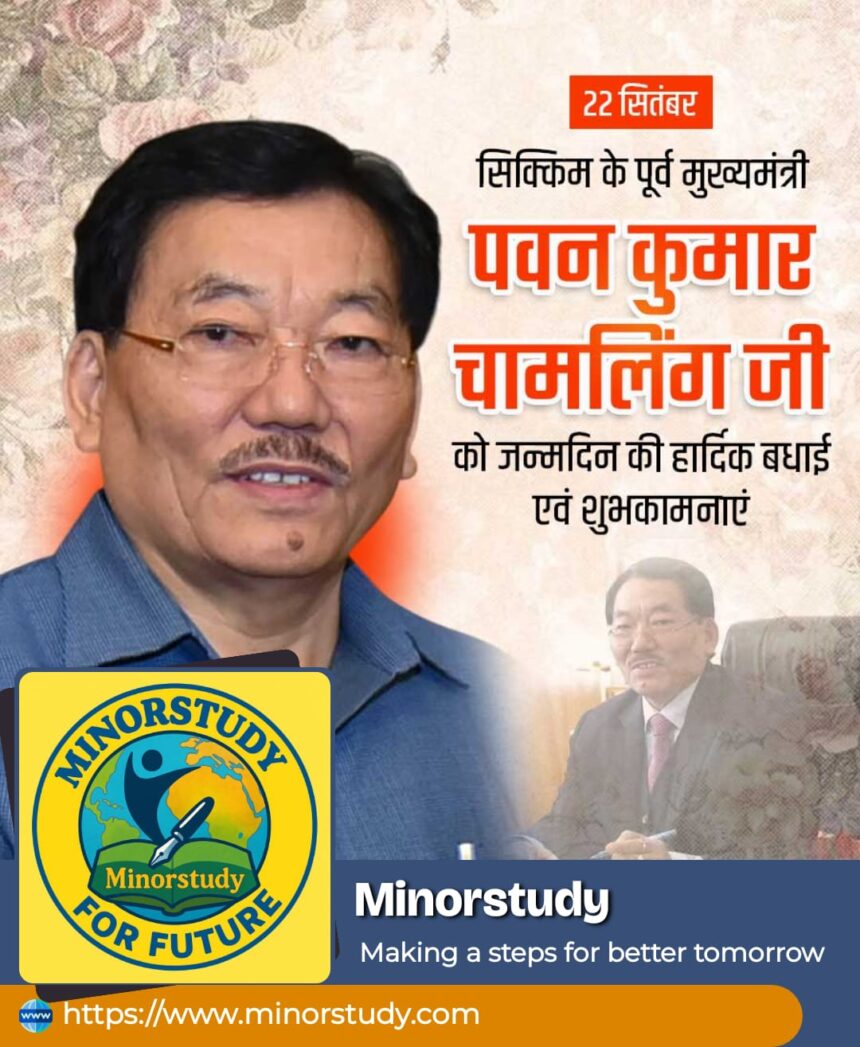Pawan Kumar Chamling – The Visionary Leader Who Transformed Sikkim
Introduction
Leadership is not just about holding power—it’s about leaving behind a legacy that impacts people’s lives for generations. One such leader in modern Indian politics is Pawan Kumar Chamling, the former Chief Minister of Sikkim. Known for his record-breaking tenure of 24 years, he is one of India’s longest-serving Chief Ministers. His vision for sustainable development, environmental preservation, and social welfare earned him both national and international recognition.
- Introduction
- History of Pawan Kumar Chamling
- Fascinating Facts About Pawan Kumar Chamling
- Timeline of Pawan Kumar Chamling’s Journey
- Significance of Pawan Kumar Chamling’s Leadership
- Observance and Reflection
- Wishing on Pawan Kumar Chamling’s Day
- FAQs About Pawan Kumar Chamling
- Importance in Daily Life and Society
- Conclusion – Daily Life Impacts of Chamling’s Legacy
This article takes you on a journey through the history, achievements, timeline, facts, significance, and lasting legacy of Pawan Kumar Chamling. It also answers common FAQs, shares thoughtful wishes, and reflects on the importance of his work in daily life and society.
History of Pawan Kumar Chamling
Born on 22 September 1950, in Yangang, South Sikkim, Pawan Kumar Chamling grew up with firsthand experience of rural challenges. Before entering politics, he worked as a farmer, writer, and social worker. His humble beginnings shaped his political vision—focused on rural empowerment, education, and environmental preservation.
Chamling entered politics in the late 1970s and was first elected to the Sikkim Legislative Assembly in 1985 as a member of the Sikkim Sangram Parishad. His leadership qualities quickly became visible, and in 1993, he founded the Sikkim Democratic Front (SDF).
He became Chief Minister in December 1994, and under his leadership, Sikkim witnessed a transformation—from a fragile Himalayan state to a role model of sustainable development in India.
Fascinating Facts About Pawan Kumar Chamling
Longest-Serving Chief Minister: Chamling served as Sikkim’s CM for 24 years (1994–2019), the longest tenure for any CM in India.
Green Mission: He declared Sikkim as the first fully organic state in India in 2016, earning praise worldwide.
Award-Winning Leader: He received the UN’s Future Policy Gold Award 2018 for organic farming.
Social Reforms: His government introduced welfare programs in education, healthcare, and women empowerment.
Writer and Poet: Chamling is also a Nepali-language poet and writer, publishing several works.
Focus on Environment: He banned plastic bags, promoted eco-tourism, and emphasized sustainable practices.
Youth Development: Chamling invested in skill development, technology adoption, and entrepreneurship programs for Sikkimese youth.
Timeline of Pawan Kumar Chamling’s Journey
1950: Born in Yangang, South Sikkim.
1970s: Started as a social worker and writer.
1985: Entered politics; elected to Sikkim Legislative Assembly.
1993: Founded the Sikkim Democratic Front (SDF).
1994: Became Chief Minister of Sikkim.
1994–2019: Served five consecutive terms, implementing landmark reforms.
2016: Declared Sikkim India’s first fully organic state.
2018: Won the UN Future Policy Gold Award for sustainable agriculture.
2019: Resigned after SDF lost elections to the Sikkim Krantikari Morcha (SKM).
Significance of Pawan Kumar Chamling’s Leadership
Chamling’s leadership left a deep mark on Sikkim and India:
Sustainable Agriculture: By making Sikkim a fully organic state, he set a global example.
Environmental Protection: Policies on eco-tourism, forest conservation, and banning harmful chemicals preserved biodiversity.
Social Welfare: His government promoted education, healthcare, women empowerment, and welfare schemes for the underprivileged.
Political Stability: Serving continuously for 24 years, he provided Sikkim with stability and consistent governance.
Global Recognition: Sikkim became known internationally as a model for sustainable development.
Cultural Pride: His encouragement of Nepali language and literature strengthened Sikkim’s cultural identity.
Observance and Reflection
Unlike religious festivals, Chamling’s contributions are observed through policies, public memory, and development models. On his birthday, supporters often organize cultural events, seminars, and social service activities to honor his leadership. Schools and universities discuss his role in making Sikkim a pioneer in organic farming and environmental sustainability.
Wishing on Pawan Kumar Chamling’s Day
Here are some wishes you can share to honor him:
“On this day, we celebrate Pawan Kumar Chamling’s vision for a green and sustainable Sikkim.”
“Wishing health and happiness to the leader who transformed Sikkim into India’s first organic state.”
“May future leaders be inspired by Chamling’s dedication to environment, education, and people’s welfare.”
FAQs About Pawan Kumar Chamling
Q1. Who is Pawan Kumar Chamling?
He is an Indian politician, poet, and former Chief Minister of Sikkim, known for his record tenure of 24 years.
Q2. Why is he famous?
He made Sikkim the first fully organic state in India and was honored globally for sustainable agriculture policies.
Q3. Which party did he found?
He founded the Sikkim Democratic Front (SDF) in 1993.
Q4. What awards has he received?
He received the UN Future Policy Gold Award (2018) for organic farming and several national recognitions.
Q5. How long did he serve as CM?
He served five consecutive terms from 1994 to 2019.
Q6. What is his contribution to literature?
Chamling is a published poet and writer in Nepali language.
Q7. How did he impact daily life in Sikkim?
His policies improved education, healthcare, women’s empowerment, and environmental awareness.
Importance in Daily Life and Society
Pawan Kumar Chamling’s policies continue to influence daily life in Sikkim and beyond:
Organic Lifestyle: His push for organic farming inspires people to adopt healthy diets.
Eco-Conscious Living: Bans on plastics and focus on eco-tourism encourage environmentally responsible choices.
Education: Investment in schools and higher learning has given Sikkim one of the highest literacy rates in India.
Healthcare: Strengthened health infrastructure ensures better access to medical care.
Women Empowerment: His programs supported women entrepreneurs and self-help groups.
Cultural Pride: Promoting Nepali literature and traditions deepened people’s sense of identity.
For society, his legacy shows that politics can align with sustainability, proving development and environment can go hand-in-hand.
Conclusion – Daily Life Impacts of Chamling’s Legacy
Pawan Kumar Chamling’s journey is more than political history—it’s a lesson in visionary leadership. His 24-year governance demonstrates how consistent leadership, rooted in values of sustainability, welfare, and stability, can transform a small Himalayan state into a global role model.
In our daily lives, his message is clear:
Respect the environment.
Invest in education and health.
Build policies that sustain communities for generations.
As we reflect on his contributions, we realize that Chamling’s leadership is not only significant for Sikkim but also for the world looking for sustainable models of governance. His story continues to inspire new leaders, thinkers, and common citizens to build a future where development and nature coexist harmoniously.








